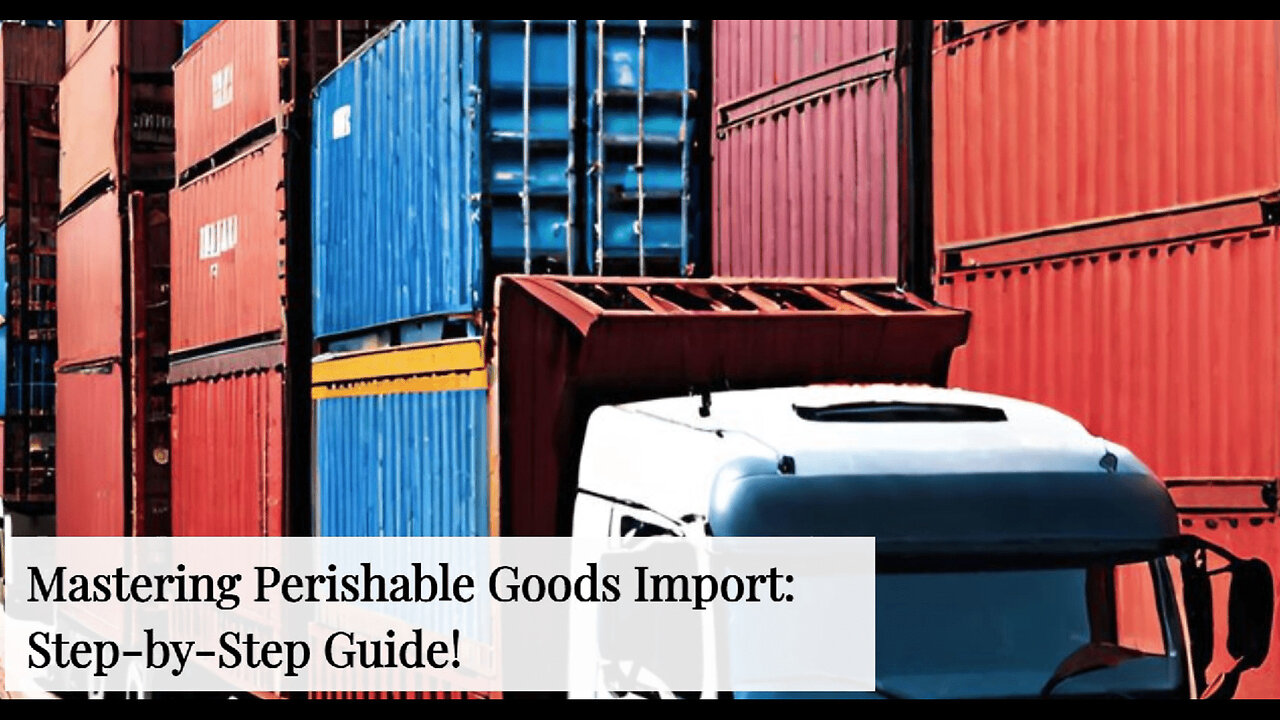Premium Only Content

Mastering the Art of Importing Perishable Goods: Your Comprehensive Guide
ISF Solution | (832-904-9333)
clearance@isfsolution.com | www.isfsolution.com
Importing perishable goods requires careful planning and adherence to specific procedures to ensure that the products arrive in optimal condition. The first step in the process is to hire a customs broker who is knowledgeable about customs regulations, tariffs, and documentation requirements. They can assist with completing accurate paperwork and determining the correct customs bond. The next step is to file an Importer Security Filing (ISF) at least 24 hours before the goods are loaded onto the vessel. This filing provides specific information to the US Customs and Border Protection (CBP) to assess the security risk of the cargo. Failure to file the ISF correctly or on time can result in penalties and delays.
Once the ISF is filed, coordination with transportation providers is essential. It is crucial to ensure that the transportation equipment used, such as temperature-controlled containers, is appropriate to maintain the freshness of the goods. Working with experienced shipping companies specializing in handling perishable items can minimize the risk of spoilage or damage during transit.
Upon arrival at the port of entry, customs clearance is required. The hired customs broker will handle the necessary paperwork and work closely with customs officials to ensure compliance with regulations. All required documentation, including the commercial invoice, packing list, and permits or licenses, must be readily available.
During the customs clearance process, inspections may be conducted on the perishable goods. These inspections can include checking for proper labeling, verifying documentation accuracy, and sometimes physical inspections of the goods themselves. Perishable goods, especially of animal or plant origin, may be subject to additional inspections.
Once customs clearance is obtained, a well-coordinated delivery plan should be in place to ensure the products remain fresh and reach their final destination timely. Specialized transportation services offering temperature-controlled delivery and storage options may be necessary. Efficient delivery is crucial due to the perishable nature of the goods.
In summary, importing perishable goods involves hiring a customs broker, filing an ISF, coordinating with transportation providers, ensuring proper temperature control, going through customs clearance, managing inspections, and arranging for timely delivery. By following these steps and working with experienced professionals, the importation process can be navigated with confidence while ensuring the quality of perishable goods.
#usimportbond #isfcustomsbroker #uscustomsclearing #isfentry
Video Disclaimer Here: For educational purposes - No affiliation with US government sectors.
0:57 - Importer Security Filing
-
 LIVE
LIVE
SavageJayGatsby
1 hour agoSpicy Saturday with Mally! | Road to 100 | $300 Weekly Goal for Spicy Bites!
64 watching -
 DVR
DVR
Akademiks
6 hours agoRoc Nation & Meg Thee Stallion did a 7 HOUR Deposition with me. Drake Secret Kid Finally Revealed.
18.1K1 -
 LIVE
LIVE
Mally_Mouse
20 hours ago🌶️ 🥵Spicy BITE Saturday!! 🥵🌶️- Let's Play: Tower Unite!
122 watching -
 24:19
24:19
Stephen Gardner
2 hours ago🚨BREAKING: FBI Raid of John Bolton’s House Reveals THIS!
20.3K48 -
 8:31
8:31
MattMorseTV
4 hours ago $0.73 earnedTexas just did the IMPOSSIBLE.
22.1K54 -
 24:39
24:39
MYLUNCHBREAK CHANNEL PAGE
1 day agoInterdimensional Beings at Borobudur
29.4K18 -
 12:42
12:42
Scammer Payback
22 hours agoCalling Scammers who were Raided
9.46K10 -
 23:31
23:31
IsaacButterfield
15 hours ago $0.02 earnedThe Woke Mob Is Really CANCELLING Matt Rife For THIS…
9.83K10 -
 1:23
1:23
WildCreatures
8 days ago $0.94 earnedThis mother armadillo eating her palm nuts is truly adorable
10K14 -
 8:59
8:59
The Art of Improvement
10 hours ago $0.01 earnedHow to Build the Most Powerful Mindset for Success
9.9K2